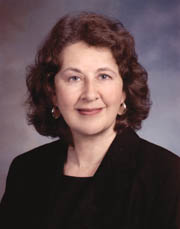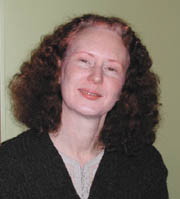A Gift Seasoned
By Time
By Lynn Schwartz
The right word, the flawless sentence,
the echoing simile---Moss can write," says The Baltimore Sun about
Barbara Klein Moss. Such a direct, unqualified statement would
be high praise for the most celebrated author but is a real achievement
for someone publishing a first collection.
 Moss, who resides in Annapolis, says "I never wanted to be anything
but a writer," and she has been quietly and doggedly pursuing
her goal for decades. The result of Moss' persistence is the fulfillment
of a long-held dream---the literary fiction debut of "Little Edens,"
a collection of short stories wrestling with Edenic themes.
Moss, who resides in Annapolis, says "I never wanted to be anything
but a writer," and she has been quietly and doggedly pursuing
her goal for decades. The result of Moss' persistence is the fulfillment
of a long-held dream---the literary fiction debut of "Little Edens,"
a collection of short stories wrestling with Edenic themes.
"I have always been intrigued by the idea of Eden," says Moss,
not a surprising statement given her intelligent, philosophical
and curious manner. The characters that inhabit these eight stories
are on a quest for perfection, for the contentment and belonging
that will transcend the reality of their less-than-paradisiacal
lives.
In the title story, Myra and Russell Calvert, parents who have
lost their only son, move to southern California to assuage their
grief. The couple begins to frequent the surrounding gated communities
with names like Toscana, Lisboa, and Persian Gardens, searching
for earthly paradise.
In "Rug Weaver," a retired rug merchant wanders in memory back
to his long, solitary imprisonment in an Iranian jail where, in
order to retain his sanity, he wove an elaborate rug in his mind.
The last story in the book, a novella entitled "The Palm Tree
of Dilys Cathcart," features an English piano teacher who is approached
by an Orthodox Jewish butcher for help in transcribing the music
he composes in his head. The power of their partnership causes
Dilys Cathcart to consider leaving her world and joining his.
For Moss, the fascination with an idealized Edenic place took
root early. "As a child, I too longed for a little Eden of my
own," says Moss.
Moss' parents were Brooklynites, children of immigrants from Eastern
Europe. Her father had polio as a child and was disabled on one
side of his body. They felt that country life would be easier
for him, and the family moved to northwest New Jersey. "It was
like something out of a Norman Rockwell painting," says Moss.
"But my brother and I needed something different, something larger
than this life."
Eventually, Moss left for Syracuse University to study art history
and English. After graduation, she moved to Boston where she worked
as a ghostwriter for an MIT professor who was writing about Gauguin,
the renowned painter whose work was influenced by the ideas of
Eden. For three years, Moss poured herself into the project, writing
as if it were a novel. It marked the beginning of her own Eden-inspired
writing.
Moss, adventurous and spontaneous, had stints in New Mexico (where
a grant from the Wurlitzer Foundation provided a little adobe
house in which to write for eight months) and in England where
she worked in an antiquarian bookstore.
It was upon her return to Cambridge, Mass., that she met her husband,
Stewart Moss. Stewart, clearly a kindred spirit, had just returned
home from a long journey to Afghanistan and Nepal. To her surprise,
he invited her to celebrate his birthday. He brought flowers and
dinner, an elegant park picnic spread out on an exotic Arab cloth
from his travels. They dined overlooking the city and married
just a few months later.
By the time Moss was 40, the couple began the process to adopt
a daughter from Korea. Their daughter Sara, now 19, is a sophomore
at Mt. Holyoke College. Her exuberance and vivaciousness complement
her mother's quiet and soft demeanor. "I'm very proud of my mother.
She's not a quitter," says Sara. "I see copies of her book in
the bookstores, and I get so excited because I love the book."
Sara is not the only one who is impressed by her mother's work.
"Little Edens" has received several glowing national reviews and
the admiration of fellow writers. Laura Oliver, a writing colleague
who teaches in the fine arts program at St. John's College and
who also publishes literary fiction says, "Barbara's work resonates.
Her characters are fully-imagined beings, who go on living in
the reader's minds, extending their lives and the pleasure a reader
takes in sharing those lives beyond the page."
Despite the recent attention, Moss has spent most of her writing
life in isolation, juggling jobs, marriage and motherhood. It
was not until the age of 52 that Moss applied and was accepted
to the MFA program for writers at Warren Wilson College. During
the two-year, low residency program she gained confidence. "I
finally took on the identity of a writer."
She was also able to benefit from the guidance of seasoned and
respected writers such as Andrea Barrett. It was Barrett who encouraged
Moss to stay true to her own voice and style and not to follow
contemporary writing trends. "This is the kind of writing you
do," she told Moss. "This is who you are."
Another change that fueled her fiction was the Moss family's move
to California. "It was a life change," says Moss.
"We were coming from long winters and the rigidity of a New England
boarding school post to the land of permissiveness, where pleasure
was all," says Moss. "It was like being on another planet." Luckily,
Moss was able to incorporate the cultural shock she felt into
her stories.
After three years in California-style paradise, Stewart Moss became
the head of the upper school at The Key School in Annapolis.
In Annapolis, things started to happen. New England Review published
a story, and the Georgia Review published "Rug Weaver." "Suddenly,
everything became possible," says Moss. "At that moment you think
the heavens have opened up."
And open up they did. "Rug Weaver" went on to be selected by the
prestigious Best American Short Stories 2001, and W. W. Norton
offered a two-book contract.
What makes her work so good is that Moss has never followed the
well-traveled path in her personal or writing life. Unlike many
writers today, her stories are not autobiographical. In fact,
she says, "There is a necessity to write away from my life. They
are all from my imagination." She also never outlines or knows
the end of her stories at the start. "They have their own life.
It's terrifying but exhilarating. You have to trust it."
At age 61, Barbara Moss' writing is no longer unsung. She says
her age has made her very focused about the work. She does not
take the opportunities she's been offered for granted, nor does
she waste time lamenting the books she might have written if recognition
had come earlier. "I know that the work I'm doing now is deeper
and richer than what I would have produced in my twenties and
thirties, that it's seasoned by all I've observed, all I've lived
through over the years."
Moss began with a facility for language but has now acquired a
vision for her writing, which she calls a "mid-life gift." "Maybe
I won't turn out quantities of books, but I intend to write a
few that are as good as I can make them." The beautifully written
and thought-provoking "Little Edens" is already proof of that
promise.
 Lynn
Schwartz is a freelance writer. She also owns and operates
Cafe Beaux Arts at Maryland Hall. Lynn
Schwartz is a freelance writer. She also owns and operates
Cafe Beaux Arts at Maryland Hall.
|
Back
|

